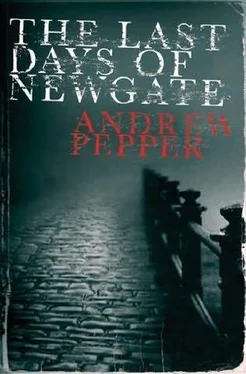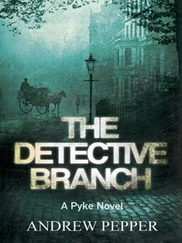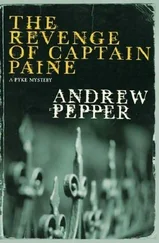Andrew Pepper - The Last Days of Newgate
Здесь есть возможность читать онлайн «Andrew Pepper - The Last Days of Newgate» весь текст электронной книги совершенно бесплатно (целиком полную версию без сокращений). В некоторых случаях можно слушать аудио, скачать через торрент в формате fb2 и присутствует краткое содержание. Жанр: Исторический детектив, на английском языке. Описание произведения, (предисловие) а так же отзывы посетителей доступны на портале библиотеки ЛибКат.
- Название:The Last Days of Newgate
- Автор:
- Жанр:
- Год:неизвестен
- ISBN:нет данных
- Рейтинг книги:4 / 5. Голосов: 1
-
Избранное:Добавить в избранное
- Отзывы:
-
Ваша оценка:
- 80
- 1
- 2
- 3
- 4
- 5
The Last Days of Newgate: краткое содержание, описание и аннотация
Предлагаем к чтению аннотацию, описание, краткое содержание или предисловие (зависит от того, что написал сам автор книги «The Last Days of Newgate»). Если вы не нашли необходимую информацию о книге — напишите в комментариях, мы постараемся отыскать её.
The Last Days of Newgate — читать онлайн бесплатно полную книгу (весь текст) целиком
Ниже представлен текст книги, разбитый по страницам. Система сохранения места последней прочитанной страницы, позволяет с удобством читать онлайн бесплатно книгу «The Last Days of Newgate», без необходимости каждый раз заново искать на чём Вы остановились. Поставьте закладку, и сможете в любой момент перейти на страницу, на которой закончили чтение.
Интервал:
Закладка:
Mary Johnson was intelligent and credible. Pyke believed everything she had told him.
Pyke was now certain that Charles Hume and his investigative team had arrested and charged the wrong man. But he didn’t necessarily believe that Hume was corrupt. Pressure for a quick arrest had, no doubt, been forthcoming from Peel and charging an escaped Bedlamite was politically expedient. So how might Hume, or for that matter Peel, react to Pyke’s news? It was hard to judge. Or rather Peel was hard to judge. Hume would reject his claim outright and would threaten Pyke, should he continue with his own investigation. Peel, though, would have to be sensitive to the political implications associated with convicting and, doubtless, killing the wrong man. For Peel knew about Pyke’s relationship with Fox and would be only too aware that Fox continued to wield enough political clout to cause him considerable embarrassment.
Peel could not afford to ignore his claims.
Pyke thought about taking his discoveries directly to Fox but he was concerned that Sir Richard simply wanted to use the investigation as a stick to beat the government with. Fox didn’t care about the dead. Nor did Peel or Hume. But out of all of them, Peel was the one who could assist or damage Pyke’s cause and, for this reason, Pyke made up his mind to present his findings, in the first instance, to the Home Secretary, and give him the chance to pull Hume into line.
Pyke leaned out of the window of the carriage and shouted at Gaines, the driver, to take him directly to Whitehall. Outside, the branches of the trees were just beginning to thaw and the first signs of green were starting to show themselves. As he blew into his cupped hands to keep them warm, Pyke thought about the dead baby, more than anything irritated that it continued to unsettle him in a way he did not understand.
Pyke knew it would be hard to secure an audience with Peel himself, at least in the first instance. Peel, after all, had instructed him to deal either with Hume or Fitzroy Tilling.
Still, he did not imagine it would be quite so difficult to convince the guards outside the Home Office to even ask inside the building for Tilling. None of them seemed to know who Tilling was. Pyke explained that he was Peel’s private secretary and offered them a brief description. He introduced himself as a Bow Street Runner working at the behest of the Home Secretary himself. He said he had urgent business to share with Peel. He said they would have to shoulder the responsibility, should his news fail to reach Peel, via Tilling. It was only when he made it clear that it was a matter of the utmost importance to the security of the state that they were provoked into action.
One of the guards said he would go and make some enquiries. The other, meanwhile, led Pyke into a dingy antechamber, set off the building’s main entrance hall.
Pyke waited for almost two hours for Tilling to rescue him from the stares of the two guards. The burly man greeted Pyke without warmth and led him in silence through the main hall, past the same cantilevered staircase he had seen previously on his visit to Peel’s offices and down a flight of stairs, to a room in the basement of the building. It was furnished with two chairs and a wooden table. A gas lamp hissed quietly in the corner of the room.
Tilling told Pyke he could spare him ten minutes. He wore a well-cut jacket over a silk neck stocking and styled dark trousers. Though he possessed neither beard nor moustache, his sideburns were thick and as dark as the hair on the top of his head. He seemed agitated and distant, as though the prospect of spending even a few minutes in Pyke’s company was the last thing he wanted.
He listened, evidently bored, while Pyke explained what had happened and recounted, as briefly as he could, the course of his investigation.
While he spoke, Pyke wondered whether Tilling, as someone who knew Ireland well and had served under Peel while he had been under-secretary there, would be in a better position to comprehend the nuances of his account. He wondered, too, whether Tilling had Irish blood in him. He didn’t speak with a brogue and if he was, in part, Irish, then it was almost certain that he belonged to the Anglo-Irish planter class. This would, of course, influence the way in which he made sense of Pyke’s tale of Protestant bigotry and violence. Tilling might be hostile to the assumptions behind his claims. But in the end it was just a name that seemed to rouse the man from his indifference.
Pyke could not, of course, be certain that the name ‘Davy Magennis’ had registered as forcefully as he imagined, but it was also true that, as a rule, he rarely misread other people’s reactions.
Afterwards, Tilling’s demeanour did become more agitated and he stopped listening to Pyke’s account and fidgeted in his chair. His manner did not become obviously aggressive but almost at once, and without warning, he stood up and told Pyke that he had important business to attend to. Assuring Pyke that his claims would be properly investigated, he thanked him for his efforts.
Tilling left him with the two guards and did not bother to issue any form of farewell.
TEN
It was a long time since Pyke had spent any real time in his gin palace and it struck him what an unpleasant place it had become. Perhaps he had deluded himself when he had first bought and transformed the building, hoping it would become a sophisticated drinking venue, with a better class of customer attracted by brilliant interior gas lights that shone through large plate-glass windows. Pyke’s own reputation may have been successful in deterring society’s dregs from regularly drinking there — the scavengers, petty thieves, coal-heavers and prostitutes who gravitated towards the neighbourhood’s less salubrious alehouses and drunken ex-sailors who preferred the gin shops on the other side of the river. But offers of cheap gin were enough to lure all types of working men and women to the bar: porters from St Bartholomew’s, animal drovers, stable boys and meat cutters from the market and traders who sold fruit and vegetables from their barrows, all of whom wanted to get fall-down drunk and didn’t care about the ornamental parapets or the fact that the drinks were served in glasses rather than clay pots or pewter mugs.
Pyke had no affinity with his customers and showed little interest in the daily running of the place. It was an investment and it gave him a modest additional income. And if Pyke had no affinity with his paying customers, nor did he have anything in common with the people who worked for him. Aside from Lizzie, who was upstairs in the attic room tending to George, the faces were unfamiliar or hostile to him. But Pyke did not expect gratitude from his staff: those who worked behind the bar, the glass collectors, the cleaners, the ex-bare-knuckle boxer who policed the bar and the three kitchen hands who served up a simple menu of chops, baked eggs, hot eel and pea soup. The pay was low, the work hard and at times dangerous, and the hours were long. He exploited them but he felt no guilt for doing so. If they wanted to work elsewhere, he never tried to stop them.
Pyke sat on an overturned barrel at one end of the zinc-topped mahogany counter and looked at what his gin shop had become. Somehow the term ‘palace’ seemed too absurd for words. He looked at the painted barrels behind the bar, signs advertising ‘The Real Knock-Me-Out Firewater’ or ‘The Devil’s Own’ and the wooden floor covered with sawdust and vomit.
There were two fights in the bar that night and Pyke wondered whether that was typical or not. One incident was relatively minor: a meat cutter, still wearing his bloodied work apron, swung at and missed a younger man, who stepped inside the punch and landed one of his own on the meat cutter’s jaw. The single blow sent the meat cutter sprawling on to the floor, and he was picked up and dumped outside by Billy, the ex-bare-knuckle fighter. The other fight was more serious. A ferret-faced man pulled out a pocket knife on a larger adversary and thrust the blade into the man’s abdomen. He got away before Billy could apprehend him but Pyke watched as the ex-boxer picked up the bleeding man, dragged his limp body across the crowded room and tossed him out of the side door.
Читать дальшеИнтервал:
Закладка:
Похожие книги на «The Last Days of Newgate»
Представляем Вашему вниманию похожие книги на «The Last Days of Newgate» списком для выбора. Мы отобрали схожую по названию и смыслу литературу в надежде предоставить читателям больше вариантов отыскать новые, интересные, ещё непрочитанные произведения.
Обсуждение, отзывы о книге «The Last Days of Newgate» и просто собственные мнения читателей. Оставьте ваши комментарии, напишите, что Вы думаете о произведении, его смысле или главных героях. Укажите что конкретно понравилось, а что нет, и почему Вы так считаете.












